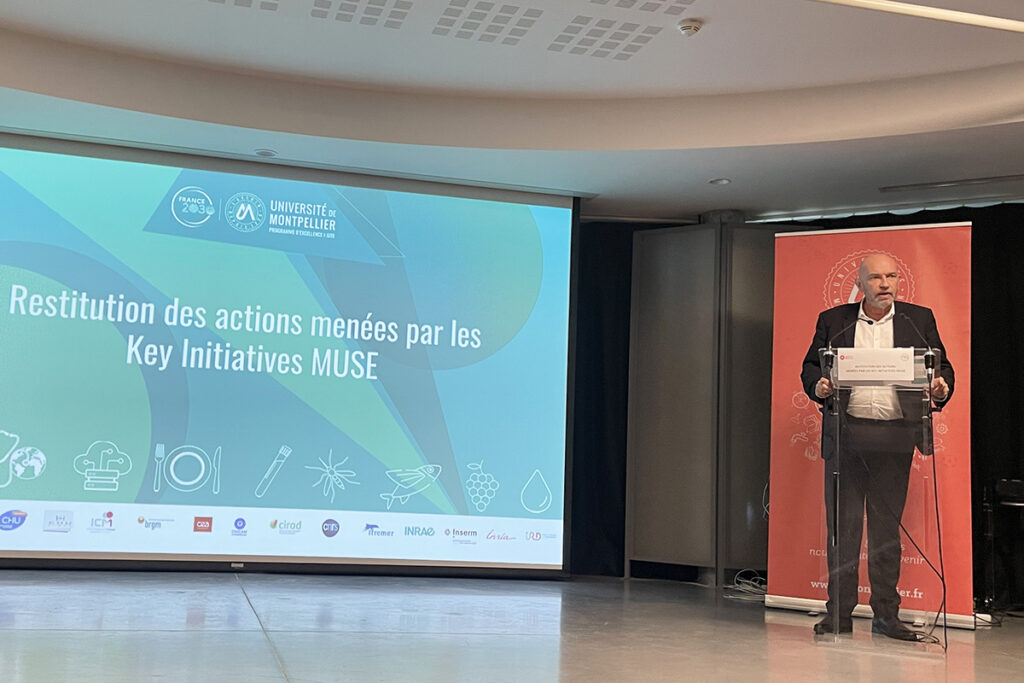Nine key initiatives and hundreds of actions developed
It's time for the nine key initiatives of the I-SITE (PEI) program of excellence to take stock. On Wednesday, November 23, 2022, the leaders of the "Muse key initiatives" presented the conclusions of their actions. This was an opportunity for them to demonstrate how they have contributed to the structuring of their scientific community and the strengthening of the national and international visibility of the University of Montpellier (UM) and its partners.

Food and health, biomarkers and therapy, data for life sciences, water, sea and coastline, climate risks and health issues, risks and vectors, blood sciences and vine and wine sciences... By focusing on these themes, the nine Musekey initiatives (Kim) embody the unique identity of the UM and its PEI partners in their region. Depending on the level of structuring of the communities at the time of their creation, or the expected societal impacts, each Kim had a specific roadmap with a common objective: to promote synergies between research, training and the socio-economic world.
Leverage effect
The various presentations demonstrated that each key initiative has had a leverage effect that justifies the extension of their actions within the framework of the Occitanie Region's défi-clé program. This is the case for the Kim " water ", " vine & wine ", " biomarkers & therapy "or " risks & vectors ". The latter will be fully integrated into the ExposUM project. Others have seen their scope expanded internationally through initiatives planned as part of the Idées program of the future investment program(PIA3). The accreditation of the Icireward Unesco international water center and the international recognition of the scientific community in this field is a fine example of the impetus given by the "water" key initiative.
The impact of these international initiatives can be measured by the number of partnerships developed and the dissemination of Montpellier's expertise in these fields. For example, the international "seeds" research projects developed within the Kim " sea & cost " program have enabled us to work with 36 international partners on all continents, and to open up avenues for the creation of a Montpellier marine science program. The planting of a core collection of 279 grape varieties representative of the genetic diversity of Vitis vinifera by Kim vine & wine is intended to inspire international partners on the two American continents, South Africa and Australia.
A key word: "interdisciplinary".
The term " interdisciplinarity " was undoubtedly the most frequently used throughout the morning's presentations and discussions. The involvement of different scientific communities around a common theme has indeed created new synergies, leading to unprecedented interdisciplinary research projects, as illustrated by the Beast project driven by the "data for life sciences" key initiative. data for life sciences ". Interdisciplinary in nature, the Kim " food & health "has enabled us to set up structuring initiatives at the agro-health interface. In the name of interdisciplinarity, shared initiatives such as "e-match" have also been developed. e-match "for access to health data for biomedical research, launched by the Kim " biomarkers & therapy "or the creation of a community services hub by the " data & life science " Kim.
Master's scholarships, summer schools, cross-disciplinary training courses... Through their various actions, the key initiatives have contributed to strengthening interdisciplinarity in the field of training, particularly for Master's students. It's no coincidence, then, that the key initiatives have been regularly referred to in the development of the IDIL(Interdisciplinary and in-lab graduate program ). The emblematic hackathon Water4futur hackathon embodies the continuum of training-research-innovation-dissemination in the service of social issues. The event brought together schoolchildren and students from 20 universities and 11 countries.
Sharing knowledge, innovating, raising awareness
While these projects are being deployed in the context of the pandemic, several key initiatives have chosen the Mooc format to enable as many people as possible to learn. For example, an international mooc on blood sciences as part of the Kim " interdisciplinary blood science "or those carried out in collaboration with the FAO on food systems, or with Wageningen University & Researcha strategic partner of the UM, on building a healthy and sustainable food environment, or the " vine & wine " mooc project.
The roadmap for the key initiatives also included a section dedicated to innovation and the economy, two major thrusts of the I-SITE program of excellence. Notable examples in this area include strengthening the dialogue between the scientific community and the business world, with the participation of key initiatives in trade fairs such as the one on the sea and the coast, and support for the emergence of innovative projects. Kim food & health has also launched a program to support start-ups and companies through Innov'labs. Lastly, the Kim climate change & healthcare sector has made raising awareness among stakeholders in healthcare organizations and developing tools to support managerial decision-making a core part of its project.
The organization of research-industry meetings in health and nutrition, known as "Biomarkers & Therapy Days". Biomarkers & therapy days "organized in conjunction with the Ad'Occ economic development agency and the Eurobiomed competitiveness cluster, have helped to raise awareness among industry players. More broadly, raising awareness among the business world and the general public has been a priority shared by all the Kims, who have organized a number of seminars, workshops and other events to share knowledge and integrate the various communities into the region.







